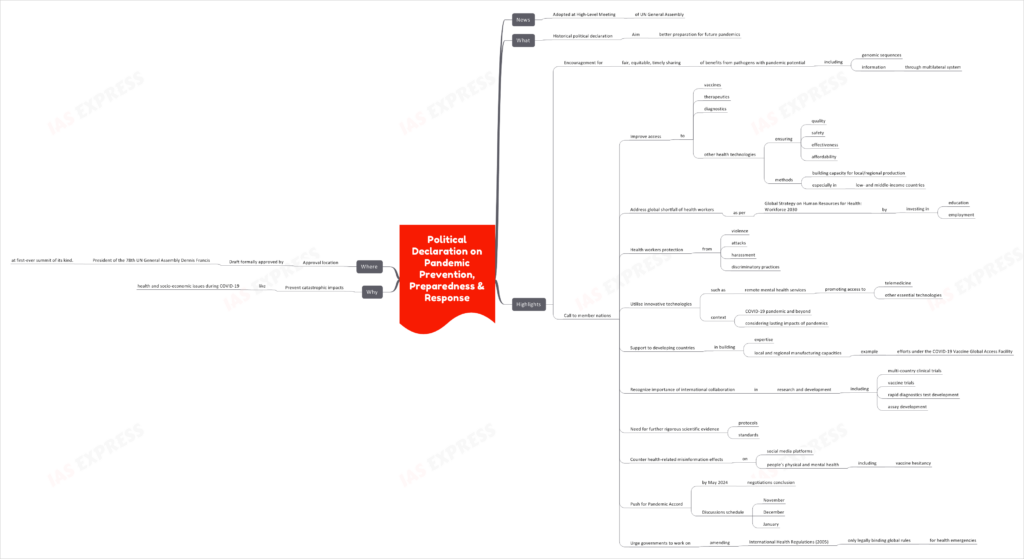Political declaration on Pandemic Prevention, Preparedness, and Response

In a historic development, the United Nations General Assembly has adopted a crucial political declaration aimed at better preparing the world for future pandemics. This significant milestone represents a collective global effort to prevent the catastrophic impacts witnessed during the COVID-19 pandemic.
This topic of “Political declaration on Pandemic Prevention, Preparedness, and Response” is important from the perspective of the UPSC IAS Examination, which falls under General Studies Portion.
The Historical Political Declaration
Aim: The primary objective of this historical political declaration is to enhance global preparedness for future pandemics, learning from the lessons of the past.
Highlights of the Declaration
Fair and Equitable Sharing of Pathogen Benefits
- Encouragement for the fair, equitable, and timely sharing of benefits arising from pathogens with pandemic potential. This includes sharing genomic sequences and information through a multilateral system.
Access to Vital Health Technologies
- A call to member nations to improve access to vaccines, therapeutics, diagnostics, and other health technologies, ensuring their quality, safety, effectiveness, and affordability. Methods include building capacity for local and regional production, especially in low- and middle-income countries.
Strengthening the Health Workforce
- Addressing the global shortfall of health workers as per the Global Strategy on Human Resources for Health: Workforce 2030 by investing in their education and employment. This declaration also emphasizes the need for the protection of health workers from violence, attacks, harassment, and discriminatory practices.
Utilizing Innovative Technologies
- Embracing innovative technologies, such as remote mental health services, to promote access to telemedicine and other essential technologies. This is seen as essential both during and beyond the context of the COVID-19 pandemic, considering the lasting impacts of pandemics.
Support to Developing Countries
- A commitment to providing support to developing countries in building expertise and local and regional manufacturing capacities. This includes efforts under the COVID-19 Vaccine Global Access Facility.
International Collaboration in Research and Development
- Recognizing the importance of international collaboration in research and development, including multi-country clinical trials, vaccine trials, rapid diagnostics test development, and assay development.
Rigorous Scientific Evidence
- Acknowledgment of the need for further rigorous scientific evidence, protocols, and standards to guide pandemic response efforts.
Countering Health-related Misinformation
- Addressing the negative effects of health-related misinformation on social media platforms, which can impact both physical and mental health, including vaccine hesitancy.
Push for Pandemic Accord
- A call to push for a Pandemic Accord by May 2024, with negotiations scheduled for November, December, and January to conclude discussions.
Amending International Health Regulations
- Urging governments to work on amending the International Health Regulations (2005), which are the only legally binding global rules for health emergencies.
Why This Declaration Matters
This historic declaration is driven by the need to prevent catastrophic impacts on health and socio-economic aspects, as witnessed during the COVID-19 pandemic. It recognizes the importance of global cooperation, access to vital health technologies, and the protection of health workers to ensure a more resilient response to future pandemics.
Where It Was Approved
The draft of this critical declaration was formally approved by President of the 78th UN General Assembly, Dennis Francis, at the first-ever summit of its kind, underlining the significance of this global commitment to pandemic preparedness.

